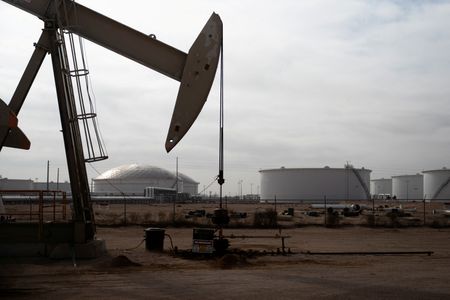By Georgina McCartney
HOUSTON (Reuters) – Oil prices settled lower on Thursday as investors weighed a report that OPEC+ is discussing a production increase for July, stoking concerns that global supply could outpace demand growth.
Brent futures settled down 47 cents, or 0.72%, to $64.44 a barrel. U.S. West Texas Intermediate crude settled down 37 cents, or 0.6%, at $61.20.
The Organization of the Petroleum Exporting Countries and its allies, known collectively as OPEC+, are discussing whether to make another large output increase at their meeting on June 1, Bloomberg News reported.
An increase of 411,000 barrels per day for July is among the options under discussion, though no final agreement has been reached, the report said, citing delegates.
“The OPEC+ speculation is the biggest factor today,” said John Kilduff, partner at Again Capital in New York.
“This OPEC+ decision is going to be pretty weighty, and it is not helping that Kazakhstan did not come through last month,” he added.
Kazakhstan’s oil production has risen by 2% in May, an industry source said on Tuesday.
OUTPUT INCREASES
Reuters previously reported that the group planned to accelerate output increases and could bring back as much as 2.2 million bpd by November. OPEC+ has been in the process of unwinding production cuts, with additions to the market in May and June.
“We’re seeing the market reacting to evidence that OPEC is letting go of a strategy to defend price in favour of market share,” said Harry Tchiliguirian at Onyx Capital Group. “It’s a bit like taking off a Band-Aid; you do it in one fell swoop.”
RBC Capital analyst Helima Croft said in a note on Wednesday that a 411,000-bpd increase from July is the “most likely outcome” from the meeting, primarily from Saudi Arabia.
“A key question will be whether the voluntary cut will be fully drawn down before the leaves turn brown in many parts of the world, in line with the original taper schedule,” she said.
Prices were already lower in the session after Energy Information Administration data released on Wednesday showed U.S. crude and fuel inventories showed surprise stock builds last week as crude imports hit a six-week high and gasoline and distillate demand slipped. [EIA/S]
Crude inventories rose by 1.3 million barrels to 443.2 million barrels in the week ended May 16, the EIA said. Analysts in a Reuters poll had expected a drawdown of 1.3 million barrels.
The EIA’s surprise stock builds will exert downward pressure on prices, particularly on WTI, said Emril Jamil at LSEG Oil Research, adding that this could further encourage more U.S. exports to Europe and Asia.
Curbing losses on Thursday, U.S. oil company Chevron’s license to operate in Venezuela will expire on May 27, U.S. Secretary of State Marco Rubio said in a post on his personal X account late on Wednesday.
“This statement by Rubio could be a game changer. But these deadlines have been extended in the past, so maybe the market is just not convinced yet,” said Phil Flynn, senior analyst with Price Futures Group.
(Reporting by Georgina McCartney in Houston and Anna Hirtenstein in London; Additional reporting by Yuka Obayashi, Michele Pek and Florence Tan; Editing by David Goodman, Conor Humphries, Susan Fenton, Ed Osmond and David Gregorio)






